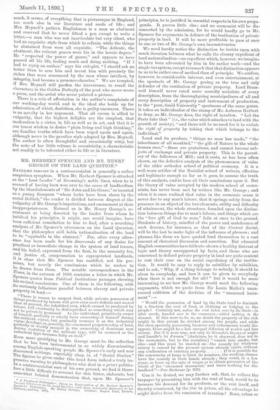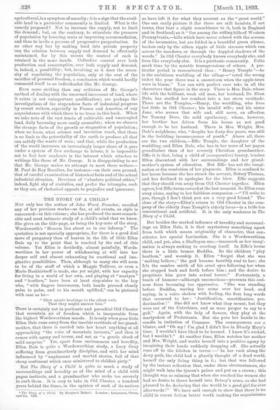MR. HERBERT SPENCER AND MR. HENRY GEO RGE ON THE
LAND QUESTION.* EXTREME rancour in a controversialist is generally a rather auspicious symptom. When Mr. Herbert Spencer is attacked as the "Lost Leader" of Browning's noble lines, when he is accused of having been won over to the cause of landlordism by the blandishments of "Sir John and his Grace," or taunted as a young Sampson "whose locks have been shorn by the social Delilah," the reader is divided between disgust at the vulgarity of Mr. George's imputations, and amusement at their inappropriateness. Natural as is Mr. Henry George's re- sentment at being deserted by the leader from whom he imbibed his principles, it might, one would imagine, have been sufficient consolation to him to find, after a searching analysis of Mr. Spencer's utterances on the Land Question, -that the philosopher still holds nationalisation of the land to be "equitable in the abstract." For, after every allow- ance has been made for his disavowals of any desire for • Practical or immediate change in the system of land tenure, and his belief, expressed from the first, in the necessity for, and justice of, compensation to expropriated landlords, it is clear that Mr. Spencer has modified, not his pre- mises, but merely the conclusions which he wishes to be drawn from them. The notable correspondence in the Times, in the autumn of 1889, contains a letter in which Mr.
his quotes from Political Institutions passages showing b. is revised conclusions. One of them is the following, with its curiously fallacious parallel between slavery and private property in land Tgsore is reason to suspect that, while private possession of thi produced by labour will grow even more definite and sacred than at present, the inhabited area, which cannot be produced by labour will eventually be distinguished as something which may not be'privately possessed.
l As the individual, primitively owner of himself, partial the militant rdgtinj or wholly loses ownership of himself during
regimis develops, but gradual] resumes it as the industrial Partially or wholly SO, the communal pro rietorshi of land, during evolution ofintehrg e ownership edpof dominant men industrial type becomes°f militant type,, will be resumed as the fully evolved.' Even more gratifying to Mr. George must be the reflection that he has been instrumental in so widely disseminating among English-speaking
people Mr. Spencer's early and now disavowed writings, especially chap. ix. of "Social Statics." The figures he gives under this head form indeed a truly im-
to philosophers who deal in a priori politics. In a eontroverisiealistt sure of his own ground, we find it there- fore a little
afalli to account for this bitter, elaborate, bat somewhat belated demonstration that, upon Mr. Spencer's
* A Potpies:ad Philosopher : Being an Erawnation of Mn. Iterbert Silencer's Vane,,,Ulternaces on the Land Question, with Some Incidental Reference to his Smithatc Philosophy. By TrUbner, and Co, 1893. Henry George. London: Hogan Paul, Trench,
principles, he is justified in essential respects in his own propa- ganda. It proves little else; and no economist will be dis- concerted by the admission, for he would hardly go to Mr. Spencer for arguments in defence of the institution of private property in land. It will be more profitable to pass at once to one or two of Mr. George's own inconsistencies.
We need hardly notice the distinction he insists upon with much iteration between what he calls the clumsy expedient of land nationalisation—an expedient which, however, we imagine to have been advocated by him in his earlier work—and the single-tar system, except to remark that that distinction appears to us to be rather one of method than of principle. We confess, however, to considerable interest, and even entertainment, at the spectacle of Mr. George posing as the true and only defender of the institution of private property. Lord Bram- well himself never rated more soundly socialists of every description, from the thoroughgoing municipalisers of all and every description of property and instrument of production, to the "poor, timid University" specimens of the same genus It takes an individualist of the stamp of Mr. Auberon Herbert to deny, as Mr. George does, the right of taxation. "Let the State take that" (i.e., the value which attaches to land with the growth of society), "and there will be no need for it to violate the right of property by taking that which belongs to the individual."
Land and its produce, "things no man has made," "the inheritance of all mankind," "the gift of Nature to the whole human race,"—these are gratuitous, and cannot become sub- jects of exchange and private property. This is the parrot- cry of the followers of Mill ; and it rests, as has been often shown, on the defective analysis of the phenomenon of value
of the older orthodox school of political economy. It is a well-worn artifice of the Socialist school of writers, effective and legitimate enough as far as it goes, to assume the truth of this analysis, and to base all their conclusions upon it, But the theory of value accepted by the modern school of econo- mists, has never been met by writers like Mr. George ; and when it is once realised that value in the economic sense is never due to any man's labour, that it springs solely from the presence in an object of the two-elements, utility and difficulty of attainment, the whole structure, founded upon the distinc- tion between things due to man's labour, and things which are the "free gift of God to man," falls at once to the ground. Students of history, mindful of the power and maleficence of such dreams, for instance, as that of the Contrat Social, will be the last to make light of the influence of phrases ; and
phrases like those we have quoted lend themselves to a vast amount of rhetorical discussion and assertion. But educated English communities have hitherto shown a healthy distrust of
logic and theory unsupported by facts, and those who are concerned to defend private property inland are quite content
to rest their case on the social expediency of the institu- tion. It would be easy to reply to subtilties by subtilties, and to ask, "Why, if a thing belongs to nobody, it should be given to everybody, and how it can be given to everybody when there is not enough for all F" but it would be more interesting to see how Mr. George would meet the following arguments which we quote from Sir Louie Mallet's unan- swered criticism of the doctrine of the "unearned inure- ment"
"Would the possession of land by the State tend to diminish by a fraction the cost of food, or clothing or lodging to the people ? Certainly not, unless the rent taken over by the State—in other words, handed over to the consumers—added nothing to the demand. If this were to be so, no doubt the property of the rich might to this extent be divided among the people, and while the class specially possessing luxuries and refinements would dis- appear, there might be a less unequal diffusion of wealth and less misery. But if it wore true, not only do Ricardo's theory of wages and Lmalle's ioi d'airain" [doctrines, be it observed, dear not to. the economists, but to the socialists] "vanish into smoke, but also—and this must be insisted on—the remedy for whatever misery is caused by the present system already exists, without
any confiscation of existing property If it is possible for
• the community at large to limit its numbers, the working classes have the remedy in their bands already ; they could, .in a few years, so force up the rate of wages as to obtain possession of the whole of the 'unearned increment,' and leave nothing for the landlord."—Free .Exchange (p. 329).
Can it be denied, we may further ask, that, to relieve the taxpayer by presenting him with the rent of land, would be to increase his demand for its products, or the rent itself, and thereby counteract, by the rise in prices, all the advantage he might derive from the remission of taxation ? Rent, urban or agricultural, is a symptom of scarcity; it is a sign that the avail- able land in a particular community is limited. What is the remedy proposed? Not to increase the supply, not to limit the demand ; but, on the contrary, to stimulate the pressure of population by lowering rents or improving accommodation, and thus to invite a process of progressive pauperisation. In no other way but by making land into private property ban the relation between supply and demand be effectually maintained, for by this means the control of each is retained in the same hands. Collective control over both production and consumption, over both supply and demand, indeed, a possibility ; but, involving as it does the neces- sity of regulating the population, only at the cost of the sacrifice of personal freedom, a conclusion which would hardly commend itself to an individualist like Mr. George.
Even more striking than any criticism of Mr. George's method of dealing with the unearned increment of land, where it exists (a not unimportant qualification), are perhaps the investigations of the stupendous facts of industrial progress by recent writers, especially in France and America, of any acquaintance with which there is no trace in this book. When we take note of the vast tracts of cultivable and unoccupied land, daily becoming more easily accessible ; when we observe the strange facts of the growth or stagnation of population ; when we learn, what science and invention teach, that there is no limit to the potentiality of the earth to produce all that can satisfy the wants of man ; and that, while the production of the world increases, an increasingly larger share of it goes under a system of free exchange to labour, it is impossible not to feel how academic is the interest which attaches to writings like those of Mr. George. It is disappointing to see that Mr. George makes no attempt to meet these writers-- M. Paul de Roy Beaulieu, for instance—on their own ground, that of careful examination of historical facts and of the actual Industrial situation. Devotees of absolute political ethics," indeed, fight shy of statistics, and prefer the triumphs, such as they are, of rhetorical appeals to prejudice and ignorance.



































 Previous page
Previous page